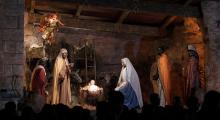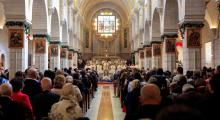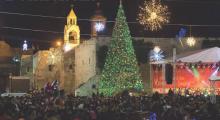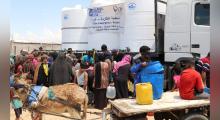Issued by the Catholic Center for Studies and Media - Jordan. Editor-in-chief Fr. Rif'at Bader - موقع أبونا abouna.org
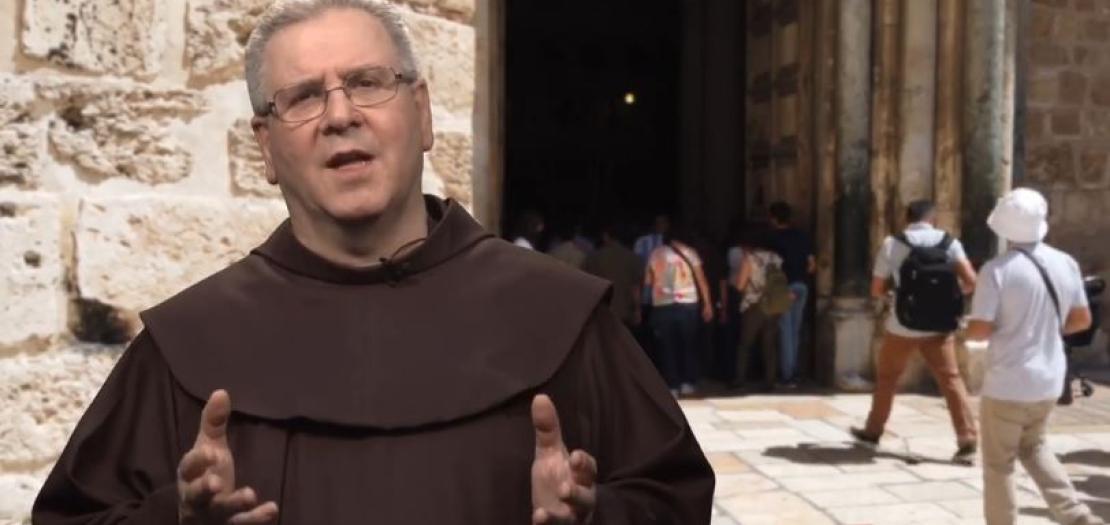
Despite tensions, Holy Week celebrations continue beautifully in the Holy Land, says the Custos of the Holy Land, noting that when there are more pilgrims, there is more stability.
In an interview with Vatican News, the Custos, Fr. Francesco Patton, OFM., discussed the escalation of violence, and attacks on Christian symbols and churches, but reiterated strongly: "No pilgrim has ever been involved in the violence."
He shares that the pilgrims have flocked back to the region and that he has been moved by the beautiful displays of faith and of solidarity.
The Custos also discusses whether the situation on the ground is as dramatic as it seems and how that has affected pilgrims and Holy Week, and comments on whether adequate security measures are being taken. He also talks about the importance of the Good Friday collection for the Holy Land, as being key to its survival and mission.
The Custos of the Holy Land is the Minister Provincial (i.e. the major superior) of the Friars Minor living throughout the Middle East. He has jurisdiction over the territories of Israel, Palestine, Jordan, Lebanon, Egypt (in part), Cyprus and Rhodes, as well as numerous houses or Commissariats in various parts of the world, including in Rome and Washington.
Following is the text of the interview with Custos of the Holy Land, Fr. Francesco Patton:
The 'Pro Terra Sancta' collection for the Holy Land, to help preserve Christian sites and help the Christian presence, is taking place on Good Friday. Why is this important for the Holy Land?
It is the first source, economical source, for the Custody of the Holy Land. This means that it is the most important source in order to maintain the Holy Places, in order to sustain the pastoral service of our parishes and also to continue our educational task through the Christian schools, and to sustain the activities, social activities for poor and needy people. For example, in our case, it also helps the population of Syria, that is very tested by twelve years of war and now by the earthquake.
The Good Friday collection, we can say, is, for us, the most important source to survive, on the one hand, and to continue our mission here in the Holy Land.
As Custos of the Holy Land, being in such close contact with the reality on the ground, how would you describe the tensions? Is the situation as dramatic as it seems externally?
The situation in some way is dramatic, and, in some way, is also sustainable. It is dramatic. If we in this moment look at the context, the political context is not in this moment stable.
It is dramatic if we look at the attacks that we received in the past months and the violence that was increasing, but at the same time, it is also sustainable because our presence here in the Holy Land was always a presence under pressure.
What is very important for us is to strengthen our faith. We have to keep always in our minds the words of Jesus: 'Do not be afraid.' We have always to remember that our strength comes from the Holy Spirit and from the relationship with Jesus, not from human resources.
Has the violence affected Holy Week celebrations? Have pilgrims returned to the Holy Land, as usual, or have less arrived, due to the violence?
I can say that when there are pilgrims, there is less violence, and so the pilgrims are very important, also as factor of stability. When there are no pilgrims, it is easier for the fanatics to have free hands. For example, in the recent past, at the end of January and immediately after January, we had a lot of acts of violence. This was a period with few pilgrims. A few days ago, I had seen the Palm Sunday procession. It was a very peaceful procession. There were no problems. The same was for the Way of the Cross last week, and I suppose the same this Good Friday. When there are a lot of pilgrims, the situation, I can say that is easier for us.
In your assessment, the pilgrims have not been deterred from arriving for Holy Week, and the celebrations thus far, have not been impacted?
In this moment, we have more or less the same number of pilgrims that we had before the pandemic, not like in 2019, but I can say like two times in 2018. In this moment, the city is overcrowded with pilgrims; and not only Christian pilgrims, because we have more or less the coincidence of the Christian Easter with the Jewish Passover and with the Muslim Ramadan. So, for example, the last Friday there were 200,000 Muslim pilgrims praying at Al-Aqsa [mosque]. The city was full of Muslim pilgrims. On Sunday, we were more than 20,000 at the Palm Sunday procession. And I suppose, that in this moment, there are thousands of Jewish civilians, also here in the city.
In the wake of those attacks, of the vandalism that has happened on Christian sites and churches, what has been, or is being, done, to protect those sites? Are authorities doing enough or taking concrete measures?
For us, it is, of course, important and necessary to ask for more security, given the acts of violence and of vandalism. Of course, it is impossible to foresee all these things and it is impossible for us to have total control. But when something happens for us, it is important to denounce the fact and to ask for security.
We want that Jerusalem be a safe place of worship for all the faithful of all the Abrahamic religions, Jerusalem is in the heart of Jewish people, of Christians, and of Muslims.
It is impossible to have 100 per cent of security. We try to have enough security and we can say that it has never, never happened that some pilgrim was involved in acts of violence, but it is impossible to have 100% of security. Always there are people out of control and acting, we can say, like lone wolves. We can ask for protection for the holy places, but it is impossible to have security at 100 percent. As I said, never, never has it happened, that pilgrims were involved.
Is there a particularly moving moment that remains with you, from serving your people in this period?
For me, what was very moving was the opportunity that I had ten days ago to visit our friars and our local Christians in Syria, those who were affected by the earthquake, since I observed incredible solidarity between the friars and the local Christians, and not only the local Christians, but also with the local population, with the Muslims. They did an excellent job of welcoming everybody in the worst time of the earthquake, hosting them in our structures. In Aleppo, they hosted about 6,000 people, and also in Latakia, and in the villages of the Orontes River. This for me was very, very, very, very moving during the Holy Week.
For me, what will be very moving will be the celebrations during Holy Week, and at the end of the Holy Week. For me, it's very special to celebrate during the night between the Holy Saturday and the Sunday of Easter, inside the Holy Sepulcher. This is very special because it is the place in which the body of Jesus laid, but also the place from which the body of Jesus rose and brought us into the life of God. When I have the opportunity to celebrate Easter inside the Holy Aedicule, for me, it is something very, very special. I think that the Resurrection of Jesus is stronger than every evil and stronger than death.



